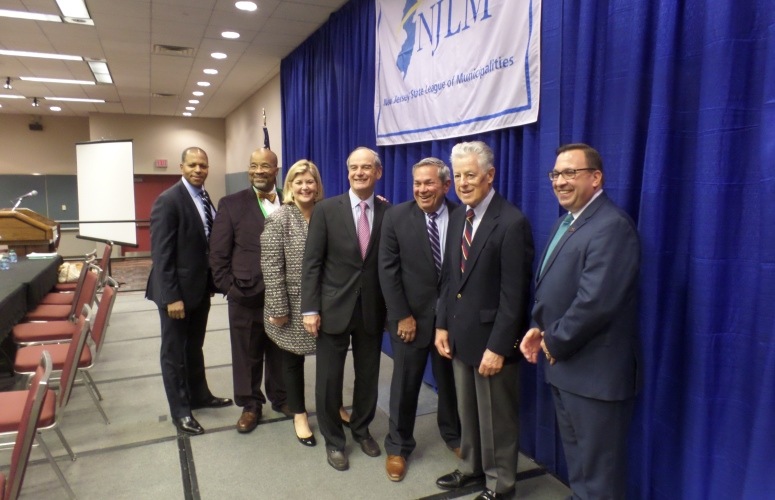
Grading the Governor at Today’s NJ League of Municipalities Conference
By Anthony Birritteri, Editor-in-Chief On Nov 14, 2018Among the various sessions occurring today at the New Jersey League of Municipalities 103rd annual conference in Atlantic City was a panel discussion on Governor Murphy’s performance during his first 10 months in office. Titled “Murphy’s Mark, the Governor’s Freshman Report Card,” panelists – ranging from three former New Jersey governors to political experts from two institutions of higher education – took an in-depth look at the administration’s successes, potential shortcomings, and upcoming challenges.
Regarding successes, former Governor John Bennett (he served as Senate President in the State Legislature and briefly as Acting Governor when Governor Christine Whitman left her post to head the Environmental Protection Agency) complimented Murphy for his strong stance on protecting the environment, saying he turned that argument into an economic one in terms of the jobs that would be created through initiatives such as offshore wind energy. He also mentioned the diversity of the governor’s cabinet and pay equity for women as successful accomplishments.
Touching upon these same issues and more was Brigid C. Harrison, professor, Department of Political Science & Law at Montclair State University, who added that the governor’s stance on gun control, refunding planned parenthood and the pay as you go initiative regarding transportation projects are all successes. However, she added that these were all “low hanging fruits.”
Meanwhile, former Governor Donald T. DiFrancesco said a great Murphy accomplishment was putting a timely budget in place, given the state’s revenue picture. However, he said the jury is still out on many issues concerning Murphy’s performance. “So far, there have been a lot of peaks and valleys and run-ins with his own Democratic majority in the Legislature,” Di Francesco said.
“The greatest challenge to Governor Murphy,” added Ben Dworkin, director of Rowan University’s Institute for Public Policy and Citizenship, “is his relationship with the state’s legislative leaders. That is critical to future successes.”
Dworkin was amazed that the governor has a 54 percent approval rating with his aggressive agenda and raising more than $1 billion in taxes. Among Murphy’s accomplishments that Dworkin mentioned were paid family leave, paid sick leave, beginning the effort towards free community college and his ongoing efforts on raising the minimum wage to $15 an hour and legalizing marijuana.
While most of the panelists gave the governor a grade of B or B+, with former Governors James Florio and DiFrancesco being noncommittal and giving Murphy a grade of “incomplete,” Harrison gave the governor the lowest marks of “C or C+.”
The reason, she said, is because Murphy has been unable to push the minimum wage increase and the legalization of marijuana through the Legislature.
Former Governor Florio commented that the greatest challenge Murphy will face is “dealing with the fiscal picture in the state, with a $60 billion shortfall in the pension system and $40 billion shortfall in the healthcare benefits system.”
Florio warned the audience that a downturn in the economy will happen sooner or later, perhaps in the next three years, and dealing with the pension and benefit shortfalls “will not be pretty.” Florio added, “The downturn will come, revenues will decrease and expenditures will rise.”
He said that the “disarray” in state government (as mentioned above) will be overcome because of the “real problems” the state will be facing. “People will be forced to come together,” he said.
At a later session, state legislative leaders discussed their initiatives and agenda in a panel discussion titled “Legislative Leaderhship: Working Together for a Better New Jersey.”
Moderator Michael Aron, NJTV political correspondent, opened the discussion with a question on the results of last week’s midterm elections.
Jon Bramnick, Assembly Republican leader, said the rhetoric coming from the White House was divisive and detrimental, and that the midterm elections results were about “New Jersey lashing out at that behavior.”
Senater President Stephen Sweeney (D) commented that as a result of the elections, the New Jersey delegation will have more power in Washington, DC, but he added that Democrats should not take anything for granted.
State Senator Robert Singer (R) said the New Jersey delegation in Washington must compromise with the White House or it will see little or no money for the Gateway Tunnel and other transportation projects.
Discussion then ranged from the reform recommendations of the Economic and Fiscal Policy Workgroup’s “Path to Progress” report, spearheaded by Senator Sweeney, with the main discourse today being school district consolidation and shared services, to the status of the marijuana legalization bill and Assembly Speaker Craig Coughlin’s anti-hunger package of bills that would, among other things, allow supermarkets to have a liquor license if they locate a facility in a so-called “food desert.”
Stay tuned for more NJ League of Municipality coverage in tomorrow’s NJBT.
To access more business news, visit NJB News Now.
Related Articles:





